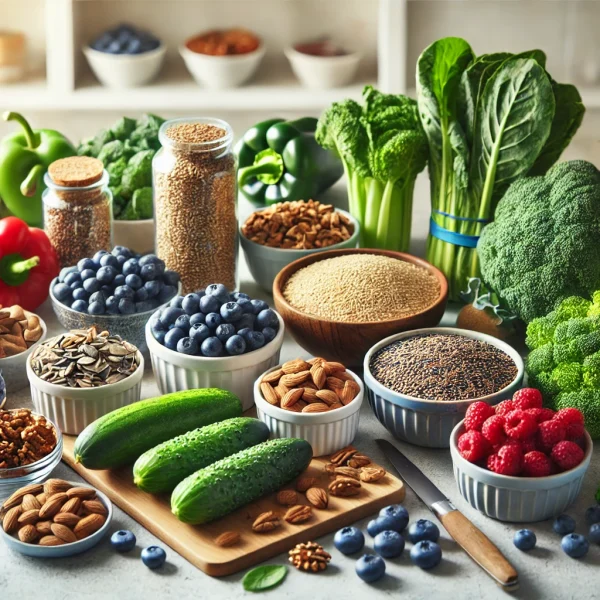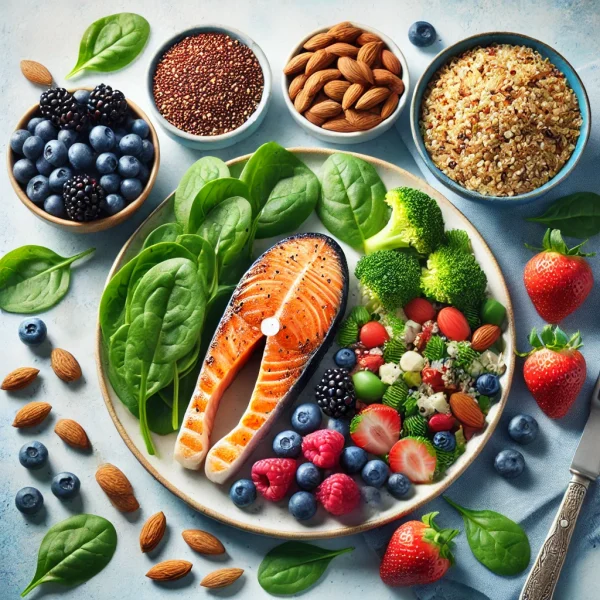Diabetic Diet Food List
Diabetic Diet Food List: Your Guide to Managing Diabetes through Nutrition

Introduction
Are you or a loved one managing diabetes in your daily life? Controlling your diet is crucial for maintaining stable blood sugar levels and overall health. At Apollo Sugar Clinics, we understand the importance of a balanced and nutritious diet for individuals with diabetes, which is why we offer personalized dietary guidance to support your condition.

Understanding Diabetes and Nutrition
What Is Diabetes?
Diabetes is a chronic condition where the body either doesn’t produce enough insulin or can’t use insulin effectively, resulting in elevated blood sugar levels. It can lead to various complications, including heart disease, kidney damage, and nerve problems if left unmanaged. However, with proper diet and lifestyle changes, you can successfully manage your condition.
The Role of a Healthy Diet in Diabetes Management
For individuals with diabetes, controlling blood sugar levels is key, and a well-planned diet plays a significant role. Certain foods can help regulate blood sugar levels, while others may cause spikes. By understanding the impact of different foods on your glucose levels, you can make better choices and avoid potential complications.
Diabetic Diet Food List: What to Eat and What to Avoid
Foods to Include in Your Diet
- Leafy Greens: Low in carbohydrates and high in fiber, vegetables like spinach, kale, and lettuce can help maintain healthy blood sugar levels.
- Whole Grains: Opt for whole grains such as quinoa, oats, and brown rice. These complex carbs are digested slowly, resulting in gradual blood sugar changes.
- Lean Proteins: Skinless chicken, fish, tofu, and legumes provide protein without excessive saturated fat, supporting heart health.
- Nuts and Seeds: Almonds, chia seeds, and flaxseeds are excellent sources of healthy fats and fiber, which promote a steady release of glucose into the bloodstream.
- Non-Starchy Vegetables: Vegetables like broccoli, cauliflower, zucchini, and bell peppers are low in calories and carbs, making them great for blood sugar control.
- Berries: Strawberries, blueberries, and raspberries are low in sugar compared to other fruits and high in antioxidants and fiber.
- Low-fat Dairy: Unsweetened yogurt, cottage cheese, and skim milk provide essential nutrients while keeping fat and sugar intake minimal.
Foods to Limit or Avoid
- Refined Carbohydrates: White bread, pasta, and pastries can cause quick spikes in blood sugar levels. Opt for whole-grain alternatives instead.
- Sugary Snacks and Beverages: Candy, soda, and other sweets can lead to rapid glucose surges, making blood sugar harder to control.
- Fried and Fatty Foods: Foods like fried chicken, chips, and processed meats are high in unhealthy fats, increasing the risk of heart complications.
- Full-fat Dairy: Whole milk and full-fat cheeses are high in saturated fats and can lead to weight gain, making diabetes management more challenging.
- Processed Foods: Pre-packaged snacks and meals often contain hidden sugars and unhealthy fats that can derail your blood sugar management efforts.
- Tropical Fruits: Fruits like mangoes, pineapples, and bananas are high in sugar, so it’s best to consume them in moderation or avoid them if possible.
Tips for Creating a Diabetes-Friendly Meal Plan
Monitor Portion Sizes
Even healthy foods can raise blood sugar levels if consumed in excess. Practice portion control by using smaller plates and measuring out servings.
Balance Your Meals
A well-rounded meal should include protein, healthy fats, fiber, and low-glycemic carbohydrates. Aim for a mix of these food groups in every meal to maintain blood sugar balance.
Stay Hydrated
Drinking enough water throughout the day can help keep your blood sugar levels in check. Avoid sugary drinks and stick to water, unsweetened teas, or infused water with a slice of lemon or cucumber.
Plan Ahead
Planning meals in advance helps you stay on track and reduces the temptation to reach for unhealthy, convenient options when you’re short on time.
How Apollo Sugar Clinics Can Help You Manage Your Diabetes Diet
Comprehensive Dietary Assessment
Our experts will assess your individual needs, taking into account your medical history, lifestyle, and current health status. This allows us to develop a meal plan tailored specifically for you.
Personalized Meal Plans
Based on your dietary assessment, we will create a personalized meal plan that ensures balanced nutrition and helps manage your blood sugar levels effectively.
Ongoing Support and Monitoring
Managing diabetes is a lifelong commitment, and at Apollo Sugar Clinics, we offer continuous support to help you stay on track. Our healthcare professionals will monitor your progress and make adjustments to your dietary plan as needed.
Why Choose Apollo Sugar Clinics for Diabetes Management?
- Expert Guidance: Our team consists of highly qualified dietitians and diabetes specialists who provide evidence-based dietary recommendations.
- Tailored Solutions: We understand that every individual’s dietary needs are unique. Our plans are customized to meet your specific health goals and lifestyle.
- Holistic Approach: In addition to diet plans, we offer comprehensive diabetes care, including medical management, exercise guidance, and ongoing education.
- Patient-Centered Care: We put your health and well-being at the forefront of everything we do, ensuring you receive compassionate and personalized care.

BOOK YOUR APPOINTMENT TODAY!
If you or a loved one is managing diabetes, schedule a consultation with us at Apollo Sugar Clinics to receive expert dietary advice. Our team is here to guide you toward better health and improved blood sugar control, helping you live a balanced, healthy life.
F.A.Q

Diet plays a crucial role in managing diabetes because the foods you eat directly impact your blood sugar levels. A balanced diet with the right nutrients helps regulate blood glucose, improves insulin sensitivity, and prevents complications associated with diabetes.
Some of the best foods for managing diabetes include:
- Leafy greens (spinach, kale)
- Whole grains (quinoa, brown rice)
- Lean proteins (fish, chicken, tofu)
- Berries (blueberries, strawberries)
- Nuts and seeds (almonds, flaxseeds)
- Non-starchy vegetables (broccoli, zucchini)
People with diabetes should avoid or limit:
- Sugary snacks and beverages (soda, candy)
- Refined carbohydrates (white bread, pasta)
- Fried and processed foods (chips, fast food)
- Full-fat dairy products (whole milk, cheese)
- High-sugar fruits (mangoes, grapes)
Yes, but it’s important to choose fruits with a low glycemic index, such as berries, apples, and pears, which have a slower impact on blood sugar. Avoid high-sugar fruits like bananas and tropical fruits, or eat them in moderation.
The glycemic index (GI) measures how quickly a food raises blood sugar levels. Foods with a low GI, such as whole grains and non-starchy vegetables, cause a slower and steadier rise in glucose, making them better for blood sugar control in diabetes.
